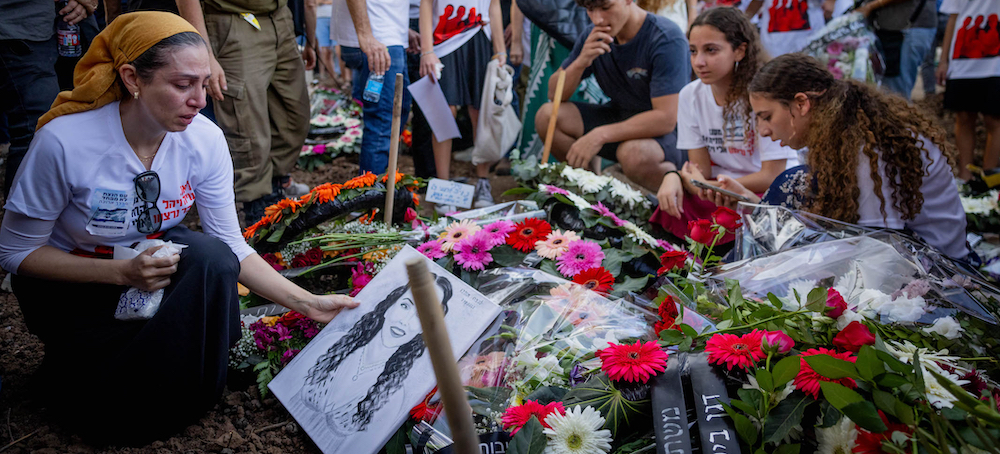It Is a Year Since My Mother Was Murdered at Her Kibbutz. Out of This Horror, Surely Peace Must Come
Yonatan Zeigen Guardian UK Family and friends attend the funeral of three members of the Sharabi family who were murdered in Kibbutz Be'eri on October 7, 2023. (photo: Chaim Goldberg/Flash90)
Family and friends attend the funeral of three members of the Sharabi family who were murdered in Kibbutz Be'eri on October 7, 2023. (photo: Chaim Goldberg/Flash90) It Is a Year Since My Mother Was Murdered at Her Kibbutz. Out of This Horror, Surely Peace Must Come
Yonatan Zeigen Guardian UK
I’ve found a political reawakening, and learned that the only way this will end is if we turn our enemies into our partners
The attack of 7 October didn’t start time. It happened in a context of prolonged occupation and conflict, of an ongoing process of dehumanisation of both sides. It didn’t start time, but it changed the course of my life. It has woken me from what I call my political coma, from the fantasy that we can lead normal lives in a place where life itself isn’t sustainable. Facing my own helplessness that day, having said goodbye to my mother while she was being murdered on the other side of the phone line, pushed me into a kind of manic phase of activism. I felt a deep sense of responsibility, an urge to become invested in change, to contribute whatever I can to create a new reality in which Israelis and Palestinians fully understand that we either flourish together – from the river to the sea – or perish.
In my mind, it was so very logical: people die because of war, so if we want to live, we need peace. There is no wall high enough to make Israelis secure, no amount of violence that will liberate Palestinians. The sole way to achieve security and liberation is to transform your enemy into your partner. And so for the past year, after quitting my job as a social worker, I’ve been obsessively using my voice in panels, webinars, dialogue sessions, old and new media and advocacy, as well as by establishing the Vivian Silver Impact award. This is not only to heal myself. We need to reshape the discourse around the conflict, to foster hope and inspire our politicians to believe it is resolvable. We need to reclaim peace.
I have also been cooperating with organisations and other activists in Israel and Palestine, in an effort to re-energise and mobilise the peace camp. We might be small in number, but our convictions are stronger than ever. With that being said, I’m aware there is a glass ceiling on the impact we can have in civil society. We need movement in the political sphere. There, we are faced with the problem of Jewish and Muslim radicalism that has gripped governments on both sides. In Israel, the occupation has become a blind spot. The occupation and conflict are the root problems, and insecurity and oppression are the symptoms. That’s where the international community is supposed to step up. Offering unconditional support for our symptoms and no relief for our core problems is counterproductive. North America and Europe should be exporting solutions, not importing our conflict to their own countries.
We need governments to form a new international coalition with the authority to offer us incentives to end the occupation and reach an agreement, and the threat to impose sanctions if we don’t. We need Jews and Muslims around the world to lay down flags and symbols and to march together under the banner of peace. When “pro-Palestinians” cancel dialogue and cheer on violence, what they are actually doing is normalising the conflict and condemning the Palestinians of the land to eternal suffering. When “pro-Israelis” weaponise antisemitism in order to silence critical thinking, and repeat the argument that Israel has the right to defend itself without acknowledging that Israel is too often an aggressor, they obstruct peace, normalise the conflict and condemn Israelis of the land to eternal suffering.
During the past year, I made it a point not only to think and talk about peace, but to find Palestinian and Israeli partners to try to make it a reality. I succeeded in the finding partners part. The making it a reality part still hasn’t happened. What may help is if this attitude became an official policy: if we had a peace ministry, for example; if our leadership sought to solve problems across the divide, rather than attempting to divide and conquer by emboldening the worst elements in both peoples just so we can blame escalation on the other side. If we let go of grand notions of religious redemption and the control of the entire land by one nation; if the international community put its full weight on us; and if we pursued pragmatic politics and understood that peace between Israel and Palestine is a geopolitical necessity – perhaps it would become possible.
A year has passed, tectonic tables have shifted, but the basic truth remains static: neither Israelis nor Palestinians are going anywhere. There is no symmetry, but we both have powerful arguments and claims, we both have the weight of history behind us. Both of those histories were written in blood and, as much as it seems unacceptable to some, we are ultimately destined to share this land. It’s time we start to mourn our past, reflectively change our present and rejoice in our shared future.
